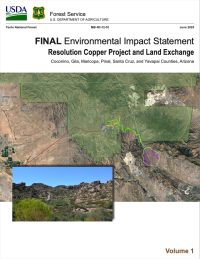The U.S. Department of Agriculture and U.S. Forest Service released the final environmental impact statement (FEIS) and draft record of decision for the proposed Resolution Copper mine.

The announcement, made Monday by USDA Secretary Brooke L. Rollins, comes amid ongoing legal battles and growing opposition from Native American tribes, environmental advocates, and lawmakers.
The proposed copper mine would be constructed on 2,422 acres of Tonto National Forest, federal land slated for transfer to Resolution Copper LLC, a company backed by British/Australian mining giant Rio Tinto and BHP.
“The Resolution Copper Project is a prime example of how we can harness America’s abundant resources to fuel growth in rural America, reduce our dependence on foreign imports, strengthen our supply chains, and enhance our national security,” Rollins said in a statement.
The FEIS outlines the environmental risks and mitigation measures associated with the mine, which is expected to create up to 1,500 jobs and generate millions in local, state, and federal tax revenue.
According to USDA figures, the project could provide up to $149 million in annual payroll, $120 million in state and local taxes, and $200 million annually in federal economic benefit.
The land exchange was initially authorized in 2014 through a rider to the National Defense Authorization Act. However, a recent federal court ruling has delayed the transfer until at least August 19, 2025, or 60 days after the FEIS is published in the Federal Register.
The court’s decision gives the San Carlos Apache Tribe and other opponents additional time to file a new legal challenge.
For years, the San Carlos Apache Tribe has led the fight against the mine, warning that the project would destroy Oak Flat (Chi’chil Biłdagoteel) , a sacred site that has been used for religious and cultural ceremonies for generations.
Tribal leaders and allies argue that the land giveaway violates religious freedom protections and trust responsibilities.
“This mine threatens to obliterate a sacred site in the name of profit,” San Carlos Apache Chairman Terry Rambler said earlier this month, after a federal judge temporarily blocked the land transfer. “We will continue to stand and fight for Oak Flat.”
Environmental groups have voiced concerns about the project’s projected impact on Arizona’s strained water resources, biodiversity, and landscape.
The FEIS itself notes that the block-cave mining method would likely cause the surface to collapse, creating a crater up to 1.8 miles wide and 1,000 feet deep.
The Biden administration previously paused the land swap in 2021, citing the need for further tribal consultation, but that reversal was short-lived.
Trump administration officials are now reviving the project, framing it as central to national interests under a broader strategy to expand domestic mineral extraction and energy production.
Public objections to the draft decision can still be submitted as part of the Forest Service’s objection process. The delay until August provides a window for further legal and policy interventions before the land transfer becomes irrevocable.
Meanwhile, tribes and environmental coalitions continue to urge Congress to pass the Save Oak Flat Act, which would repeal the land exchange clause of the 2014 NDAA.
The legislation has been introduced multiple times but has yet to reach a floor vote in either chamber.
More Stories Like This
Gwich'in Tribal Governments Submit Comments Challenging Fish and Wildlife Service's Inadequate Environmental Review of Arctic Refuge Snow RoadRappahannock Tribe Challenges 9M-Gallon Water Plan
Feds release draft long-term plans for Colorado River management
Apache Leader Walks 60 Miles to Court Hearing That Will Decide Fate of Sacred Oak Flat
Rappahannock Tribe Raises Sovereignty and Environmental Concerns Over Caroline County Water Permit
Help us defend tribal sovereignty.
At Native News Online, our mission is rooted in telling the stories that strengthen sovereignty and uplift Indigenous voices — not just at year’s end, but every single day.
Because of your generosity last year, we were able to keep our reporters on the ground in tribal communities, at national gatherings and in the halls of Congress — covering the issues that matter most to Indian Country: sovereignty, culture, education, health and economic opportunity.
That support sustained us through a tough year in 2025. Now, as we look to the year ahead, we need your help right now to ensure warrior journalism remains strong — reporting that defends tribal sovereignty, amplifies Native truth, and holds power accountable.
 The stakes couldn't be higher. Your support keeps Native voices heard, Native stories told and Native sovereignty defended.
The stakes couldn't be higher. Your support keeps Native voices heard, Native stories told and Native sovereignty defended.
Stand with Warrior Journalism today.
Levi Rickert (Potawatomi), Editor & Publisher


